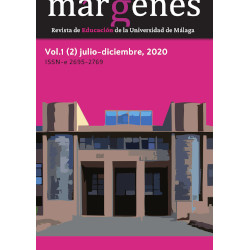Respect and intergenerational relationships in Secondary School: senses that young people from popular sectors attribute to respectful treatment by adult educators
DOI:
https://doi.org/10.24310/mgnmar.v1i2.8463Keywords:
respect, intergenerational relationships, secondary schoolAbstract
This writing arises in the Research Project "Inter-generational relations in formal educational institutions: experiences of children, youth and adults", based on the FCH - UNSL. The project's general objective is to investigate how inter-generational links are (re) constructed in formal educational settings, by exploring the experiences that children, youth and adults have of these relationships. In this framework of reflection, this work will particularly expose the meanings that young people from popular sectors who attend secondary schools in the City of San Luis have built in relation to the idea of ??"respect" in the links they establish with adult educators from their schools. To investigate this topic, we analyzed a corpus made up of 250 surveys and 25 interviews with young people.
As recent national and international research shows, the notion of respect emerges as a privileged vector to analyze the way in which inter-generational and pedagogical links are transformed today because it makes visible, among other aspects, youth experiences, needs and claims that stress school ties. In this work, in particular, we identify two large nuclei of meaning linked to how students understand the notion of respect: one-way or traditional respect, and two-way or emerging respect.
Downloads
Metrics
Publication Facts
Reviewer profiles N/A
Author statements
Indexed in
-
—
- Academic society
- N/A
- Publisher
- Universidad de Málaga
References
Aleu, M. (2008). Las concepciones de autoridad en los estudiantes de la escuela media. Tesis de Maestría en Educación. Argentina - Universidad de San Andrés.
Aleu, M. (2017) Los vínculos de respeto en la educación de jóvenes y adolescentes. Tesis Doctoral. Argentina-Universidad de Buenos Aires. Disponible en: https://bit.ly/34d41bf
Bourgois, P. (2015) En busca de respeto. Vender crack en Harlem. Argentina-Siglo XXI Editores.
Deutsch, N.; Jones, S. (2008). “Show Me an Ounce of Respect’’: Respect and Autho¬rity in Adult-Youth Relationships in After-School Programs”. En Journal of Ado¬lescent Research. Vol. 23 (6), 667-688. DOI: https://doi.org/10.1177/0743558408322250
Kaplan, K.; Silva, M. (2016) “Respeto y procesos civilizatorios. Imbricación socio-psíquica de las emociones”. En Praxis educativa, Vol. 20 (Nº 1), 28-36. DOI: https://doi.org/10.19137/praxiseducativa-2016-200103
Nuñez, P. (2007) “Los significados del respeto en la escuela media”. En Propuesta Educativa Vol. 1 (27), 80-87. https://bit.ly/2JGqrIe
Nuñez, P. (2013) La política en la escuela. Argentina-La Crujia.
Paulín, L.; Martínez, S. (2014) “Sentido y acciones en procura de respeto en la escuela”. En Paulín, L. “Jóvenes y Escuela. Relatos de una relación compleja” (45 – 72). Argentina - Editorial Brujas.
Rosales, G. (2013) “De autorizantes, autorizados y autorizaciones. Procesos de construcción de autoridad pedagógica en experiencias educativas desarrolladas con jóvenes de sectores populares”. Tesis Doctoral. España -Universidad de Málaga. Disponible en: https://bit.ly/2RbZvnW
Sennett, R. (2003) El respeto. Sobre la dignidad del hombre en un mundo desigual. España-Anagrama.
Silva, V. (2018) “La demanda por un buen trato en la escuela secundaria”. En Educação & Realidade, Vol. 43 (N. 2), 35-57. DOI: 10.1590/2175-623662538
Tenti Fanfani, E. (2000) Culturas juveniles y cultura escolar. Argentina-IIPE/UNESCO.
Todorov, T. (2007) Frente al límite. España-Siglo XXI Editores
Todorov, T. (2008) La vida en común. Ensayo de antropología general. Argentina-Taurus.
Downloads
Published
How to Cite
Issue
Section
License
The editorial team of Márgenes supports an open Access policy of scientific knowledge. apostamos claramente por una política de acceso abierto del conocimiento científico (see Berlin Declaration).
Authors with work published in this journal accept the following conditions:
- This journal provides immediate free access to its content under the principle of making research freely available to the public. All contents published in Márgenes are subject to the Creative Commons Reconocimiento-SinObraDerivada 4.0 Internacional
It is the responsibility of the authors to obtain the necessary permissions of the images that are subject to copyright.
Authors whose contributions are accepted for publication in this journal will retain the non-exclusive right to use their contributions for academic, research and educational purposes, including self-archiving or deposit in open-access repositories of any kind.
The electronic edition of this magazine is edited by the Editorial of the University of Malaga (UmaEditorial), being necessary to cite the origin in any partial or total reproduction.
- Authors can enter into other additional independent contractual agreements for the non-exclusive distribution of the version of the article published in this journal (e.g. including it in an institutional repository or publishing it in a book) on the condition that they clearly indicate that the work was originally published in this journal.
- Authors are allowed and recommended to publish their work on the Internet (for example on institutional and personal websites), before and after the publication, as this could lead to constructive exchanges and a more extensive and quick circulation of published works (see The Effect of Open Access).















